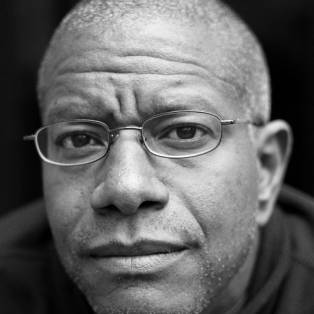Inspiring Older Readers
 posted on 18 Dec 2016
posted on 18 Dec 2016
Paul Beatty at The Sheldonian Theatre, Oxford (16.12.16)
The Oxford Literary Festival previewed it’s 2017 programme with a special event at the Sheldonian Theatre where Jon Day of Kings College, London, interviewed this year’s Booker Prize winner, Paul Beatty. Beatty is the first American to win the prize with The Sellout. The inclusion of writers from the US in the prize has been very controversial but, mercifully, neither Day, who was one of the book prize judges, nor any of the audience felt it necessary to get involved in this spat.
Beatty admitted from the outset that he was very tired – I assume he’d only just flown in from his home in New York – but he was relaxed, engaging and open. I very much enjoyed his willingness to keep his answers relatively brief and straightforward, eschewing the tendency to blather on or bluster through answers that become so convoluted you completely lose the thread. On the whole Jon Day did a good job keeping the session flowing but he did ask a couple of questions that Beatty clearly didn’t get the point of and he was more than happy to say that he didn’t understand what he was being asked rather than construct an answer that meant nothing.
Beatty spoke often of his role as a teacher of creative writing at Columbia University and he illustrated much of his own approach through examples taken from his time working with aspiring writers. Although he started life as a poet he confessed that he’d pretty much abandoned that because he found it exposed him too much – the public have an expectation of poets and believe they should be public ‘performers’ and he didn’t want to get trapped into that role. However, becoming a novelist is clearly not an easy option – he’s not a prolific writer - and he revealed that his prize-winning book, The Sellout took five years to get to the stage of publication.
Lots of claims have been made about The Sellout as a great modern day satire of the ‘race’ debate, particularly in the USA. However, Beatty made it clear that he didn’t associate himself with the label of satire. The book is certainly politically and socially engaged but, he insists, it doesn’t stand as a commentary on the current state of affairs but is an exploration of much wider issues about how people behave and what they think like. Humour is important to Beatty but his writing springs from the basic absurdity of people’s behaviour and the key to understanding what’s going on is to step back from the issues and observe from a calculated distance. This is the writer as the intelligent observer rather than the engaged activist.
The hour in his company sped past and he even managed to deal pretty well with the usual bizarre questions that came from the audience, including the truly breathtaking ‘Who do you think would play you in a movie’! Quite extraordinary.
He signed books at the end and spent time writing substantial dedications for those who wanted them. A review of The Sellout will be on this site soon and you’ll see what I thought of his book but I’m happy to say here that the writer was a delight and I would certainly go out of my way to hear him speak again.
Terry Potter
December 2016